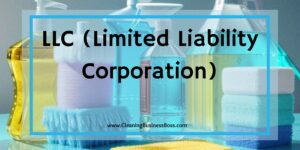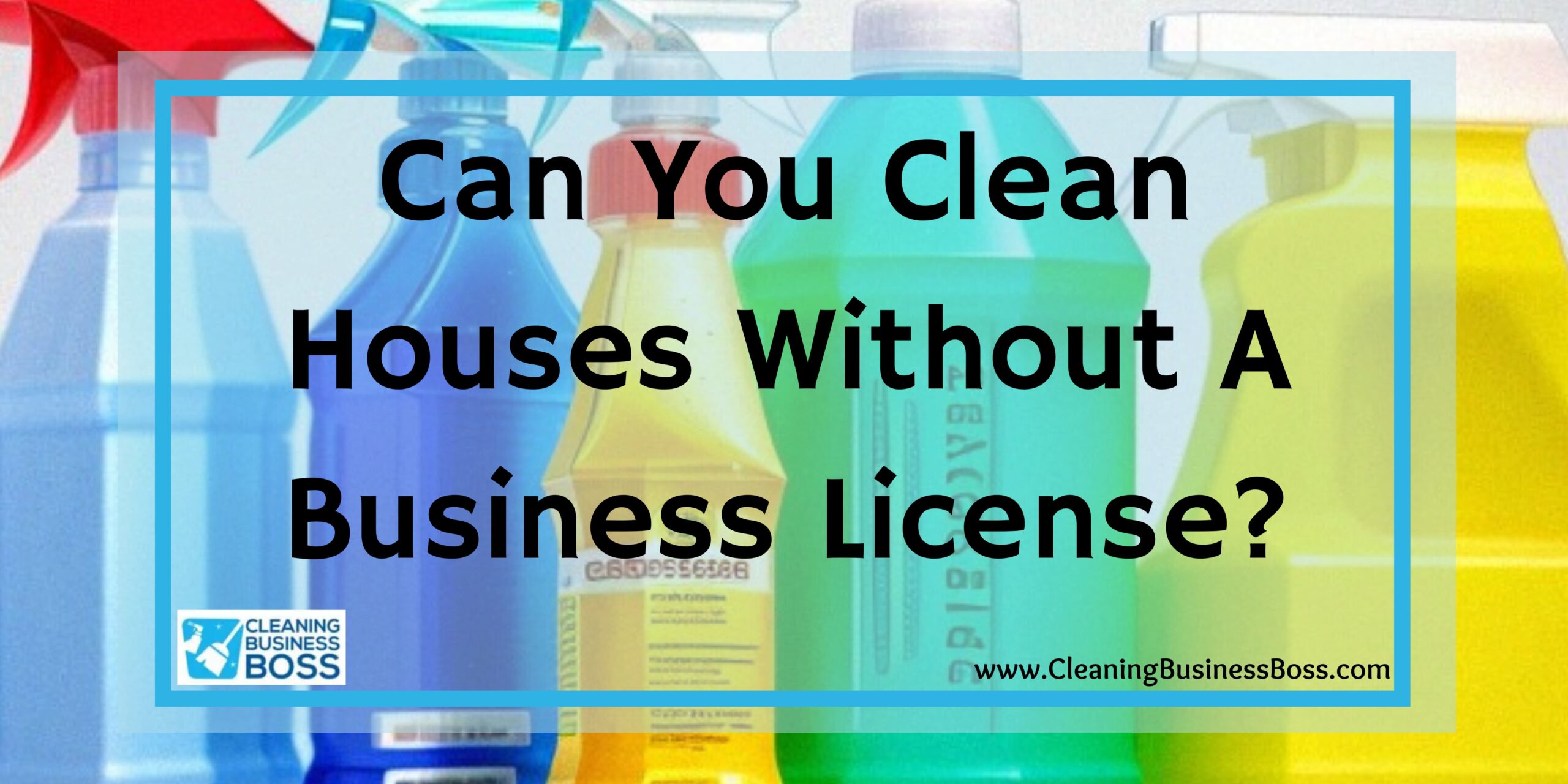You have a passion for cleaning houses, and you want to turn it into more than just a source of passive income. But you’re also new to forming your own business, and you have questions: Do you need a special permit? Or certain permissions? These are valid questions — and important ones for a future business owner, regardless of your industry.
If you are cleaning someone’s house that is not your own, you do need a vendor’s license. You will need a DBA (or Doing Business As) license if you use a certain name for your company. Additionally, you will need to file a business license with your county.
Why A Business License Is Important
When you become an LLC or vendor, the documentation is a display of credibility. You went through the process of making your business a legal entity, and because you completed this vital step, you have a higher chance of gaining your customers’ trust before you even meet them. Professionalism is the most important thing in business, because if you’re a legitimate company, you’re more likely to know what you’re doing, and you probably have experience in your line of work. A company that “does things by the book” will get noticed, and is less likely to be subject to widespread scrutiny or controversy.
Getting the credentials, you need can also have some tax benefits, as LLC’s have the ability to deduct business expenses before they are officially operational. Expenses that can be deducted as an LLC include automobile expenses, legal and professional fees, insurance (included but not limited to malpractice, liability, and credit insurance), and equipment.
If you are an LLC and you get sued, any member’s personal assets (like bank accounts) can’t be used to pay off this amount. But as with everything in life, there are exceptions. This is known as “piercing the corporate veil” — the act of courts pursuing the personal members’ assets, regardless of their LLC status.
Instances of where “piercing the veil” is valid include when company money is used for personal reasons, if fraud was involved, or if the LLC in question has massive debt (but minimal) capital. There’s no one-size-fits-all rule, and courts will make a judgment based on a case-by-case basis. Another thing to watch out for is if you are a service professional (lawyer, architect, accountant, doctor) and you want to create an LLC. Because you would have a certain prominent status previously established within your community, you would be required to form a PLLC, or Professional Limited Liability Company.
Becoming an official business also helps other vendors hold you accountable for your actions, should a conflict arise. And not having licenses at all? Well, that could cause immense financial penalties. If you aren’t in compliance with the state or county’s requirements regarding business licensing, you could face termination of your business and criminal charges, placing the business you’ve worked so hard to build in possible peril. When starting your business, be careful: Make sure you have all the required licenses before you fully commit to opening your company.
As if that wasn’t enough of a deterrent, it’s even easier for average people to report those that are operating without a license. The Better Business Bureau has a specific webpage for this purpose, and it can be located under “File A Complaint”. Another word of warning: An LLC doesn’t protect the owner if they’re sued. If they fail to settle the lawsuit with their business funds, the court will resort to seizing their personal assets.
Learn more about cleaning business insurance and bonding by visiting our article here.
Vendor’s License

There are permits required, and it’s safe to assume that you want to branch out beyond family members. (You don’t need a permit if you are cleaning for family members). The first permit you will need (a vendor’s license) allows you to be viewed as a business entity, rather than an individual. They can be obtained through a local tax office.
A vendor’s license can also help in cases of other legalities. If you have a business license, you can’t be shut down for running an illegal operation. But more than that, it gives your customers a sense of trust. It tells them that you have gone through the proper channels to make your business something legitimate, and you’re not a fan of cutting corners.
But be aware: Vending license fees can vary. You’ll want to set aside money beforehand to pay for all the potential fees, and these are typically $25. If you’re late renewing your license, however, you could be hit with a $50 fee and owe $75 in total. To be on the safe side, set aside at least $500 for all fees and license costs before you begin thinking about equipment.
DBA (Doing Business As)
A DBA license, separate from a vendor’s license, is something that can help you avoid confusion or legal issues if other businesses have similar names (such as “Pretty Edgy Design” and “Pretty Edgy Designs”), and it’s typically needed if you don’t intend to use your legal name for your company. Make sure you think of a business name, and do research to make sure it isn’t pre-existing. You wouldn’t want to get into legal problems early on.
A DBA also gives you the added advantage of gaining a business bank account if you’re a sole proprietor. Opening a business bank account isn’t required, but it is preferred, to keep your company and personal finances separate. You’ll want to keep track of your personal and business income (and expenses) in different accounts, which will make it easier to find certain transactions when you need them.
Keep in mind, filing for a DBA isn’t the same as creating a business. You need to register and be approved for an LLC or another company type before you can be considered for a DBA. Without an LLC, you’d be held liable for your company’s debts. A DBA has more to do with the name of your business than the operations of one.
LLC (Limited Liability Corporation)

When you register as an LLC, or a Limited Liability Corporation, this means any debt your company amasses is not required to be paid by the owners of the LLC (you), as they have limited liability. LLC’s operate differently from other types of businesses, and in regards to taxes, LLC’s would need to use personal income tax returns when filing. They also have the possibility of placing your company in a lower tax bracket, which could mean a lot of savings in the future.
In the instance where you have more than one person involved in your company, your LLC would require an operating agreement, which would detail how responsibilities and expenses are handled within the company, and in the case of new ownership. This agreement is meant to make all rules and regulations within the business easy to follow.
County Specific Licenses (And Miscellaneous Permits)
County business licenses are required to be established within the county you operate in. Whichever city you work out of — that’s where you’ll need to apply. You can typically apply online, so the process shouldn’t be too time consuming.
But in addition to the county permit, you’ll need to have permits specific to your state, such as fire or health permits that indicate your business can operate because it meets certain qualifications. A fire permit is especially vital in a cleaning business because certain chemicals in cleaners are more flammable than others. Pool cleaning chemicals, disinfectant sprays, aerosol cans, and drain cleaners are considered very flammable, and would pose a risk to others if not handled or stored properly.
Frequently Asked Questions
What equipment would I need to start a cleaning business?
The essentials include cleaners (glass cleaners, counter cleaners, sponges, rolls of paper towels, rags, mops and buckets, and a dustpan and broom), vacuums (handheld or a full-sized one), and a cart or carrying case for the items you use consistently. Keep track of which items are single use and which are reusable, and you’ll be much more organized.
How can I advertise my cleaning business?

Try low cost paper options first, such as business cards or brochures (many can be found in large packs for a cheap price), and then branch out to an online presence when you have established a customer base. Leave your card with each customer after a job has concluded, and make sure to get their feedback on your work so you can assess your progress over time. Remember: Start small. Don’t buy more supplies than you’ll need.
What would the initial costs be to start a cleaning business?
You need to account for one time cleaning supplies ($40-50), and then the items you would use consistently (this ranges from $50 to $1000, depending on the features you need). Business licenses usually cost around $50-100, but it really depends on the state you live in. Remember to factor in business taxes, setting aside 30-40% of your monthly income. Advertising costs will depend on the type of ad. Things can add up quickly so it is important that you create your cleaning business plan before starting.
To learn more on how to start your own cleaning business, check out my startup documents here.
Please note that the contents of this blog are for informational and entertainment purposes only and should not be construed as legal advice. Any action taken based on the information provided in this blog is solely at your own risk. Additionally, all images used in this blog are generated under the CC0 license of Creative Commons, which means they are free to use for any purpose without attribution.

About the author. Entrepreneur and Cleaning Business Fan.
Hi! I am Shawn and I am a happy individual who happens to be an entrepreneur. I have owned several types of businesses in my life from a coffee shop to an import and export business to an online review business plus a few more and now I create online cleaning business resources for those interested in starting new ventures. It’s demanding work but I love it. I do it for those passionate about their business and their goals. That’s why when I meet a cleaning business owner, I see myself. I know how hard the struggle is to retain clients, find good employees and keep the business growing all while trying to stay competitive.
That’s why I created Cleaning Business Boss: I want to help cleaning business owners like you build a thriving business that brings you endless joy and supports your ideal lifestyle.


2 thoughts on “Can You Clean Houses Without A Business License?”
Comments are closed.